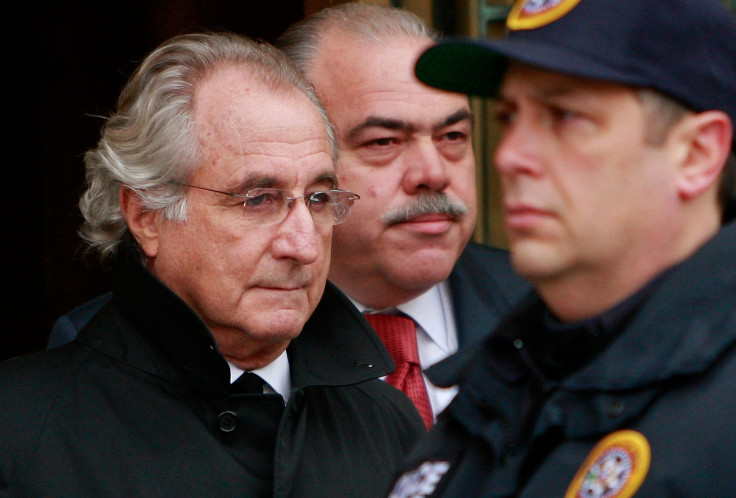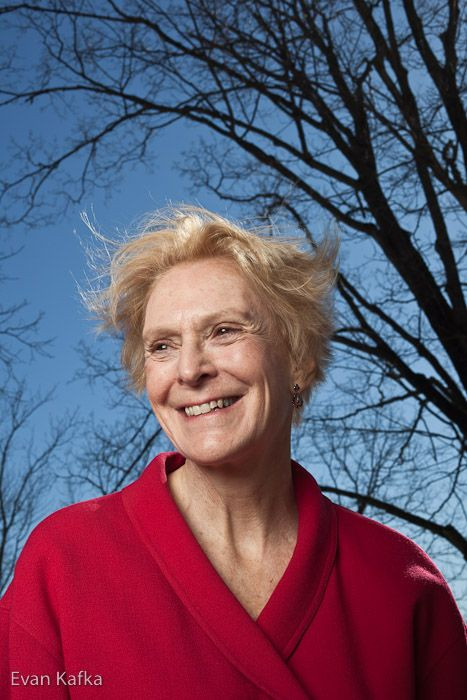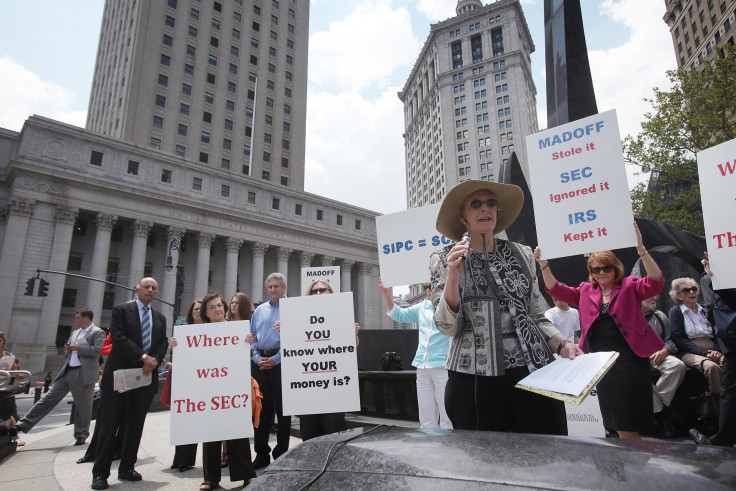Bernie Madoff: Book Says JPMorgan Chase Knew What Madoff Was Up To, Turned A Blind Eye

Say the name Bernie Madoff, and chances are everyone will immediately remember the Ponzi scheme that bilked investors of $64 billion. What likely won’t spring to mind is JPMorgan Chase’s role in the more than decadelong fraud.
And the link is all the more egregious, Helen Davis Chaitman, an attorney who represents 1,600 of Madoff’s victims, and Lance Gotthoffer write in “JPMadoff: The Unholy Alliance Between America’s Biggest Bank and America’s Biggest Crook,” because the federal government has failed to prosecute any of the bankers involved.
Democratic presidential candidate Bernie Sanders may rail about the necessity of breaking up the big banks to rein in financial abuses, but Chaitman said in an interview with International Business Times that criminally prosecuting one or two top bankers would do a lot more to clean up Wall Street.
Madoff, who started out as a penny stock trader with just $5,000 in the 1960s, was a successful Wall Street trader who once chaired the Nasdaq and whose company was responsible for making 10 percent of the trades on the New York Stock Exchange on any given day. In the early 1990s he formed an investment advisory division within his legitimate operations that turned into the largest Ponzi scheme in history. It came crashing down Dec. 11, 2008, and six months later Madoff was sentenced to 150 years in prison and ordered to pay $170 billion in restitution.

Some 4,800 people were bilked by Bernard L. Madoff Investment Securities LLC, Chaitman among them. She said she had to “hold on to some furniture because I thought I was going to faint” when a friend informed her Madoff had confessed to running the scheme.
Chaitman said as a client, she had talked to Madoff on and off for years. After he was incarcerated, he reached out to her.
“He knew I was representing a large number of Madoff victims. He wanted to impart information from his perspective on what happened. I was more interested in facts helpful to my clients,” said Chaitman, who describes herself as an expert in the field of lender liability.
“I didn’t think about JPMorgan’s complicity until he raised that issue with me,” Chaitman said. “I thought it was nonsense. Then I realized he was 100 percent right. ... If Madoff had not found a welcome reception, he wouldn’t have been anything but a small-time crook.”
Chaitman said Madoff trustee Irving Picard laid out JPMorgan’s involvement in a complaint, which was turned into a list of stipulations the government entered as part of a deferred prosecution agreement with JPMorgan. The stipulations outline two violations of the Bank Secrecy Act, under which banks are responsible for alerting authorities to suspected illegal activity by customers. JPMorgan, the world’s sixth-largest bank by total assets, pleaded ignorance of wrongdoing but accepted the stipulations and paid a $1.7 billion fine.
Madoff began kiting checks — writing a bad check on an account in one bank, depositing it in another account at a second institution and then writing a check from the second bank to the account to cover the overage in the first — to make money on the float. Bankers Trust Co. spotted the illegal activity and closed Madoff’s account. That’s when Madoff moved his business to JPMorgan, depositing $150 billion from 1986 through 2008. JPMorgan handled only Madoff’s illegal investment advisory business, not the successful stock trading business that employed 190 of Madoff’s 200 employees.

“They saw that money come in and saw where it went. It either sat in the bank or went to co-conspirators. They had a duty to monitor it under federal law,” Chaitman said.
And though the bank was prosecuted, none of the bankers involved with Madoff’s account were.
Why? Chaitman noted millions of dollars were donated to President Barack Obama’s campaigns.
“We need to elect a president who has the determination not to be bribed by Wall Street. Follow the money,” she said. “Look at the amount paid to Obama to support his election. ...
“I don’t believe the U.S. can effectively allow its politicians to be bribed like this.”
The book’s second chapter lays out JPMorgan’s wrongdoing and ridicules statements made by the bank officer in charge of Madoff’s account as well as statements by various public officials.
Chaitman said JPMorgan’s violations were not limited to Madoff, noting the bank has paid $34.6 billion in fines, penalties and settlements in everything from the rigging of banks’ overnight interest rate in London (the Libor scandal) to selling bad bundled mortgages as secure investments.
“On JPMadoff.com I have a roulette wheel which shows the $36 billion JPMorgan has paid in the last five years. ... There’s no one they won’t cheat,” said Chaitman, noting the bank, which has total assets of $2.35 trillion and revenue of $96.6 billion, handles accounts for 50 percent of U.S. households and 80 percent of Fortune 500 companies.
“Not a lot of people understand how serious this is for the average American. The best thing [to do to correct the situation] would be to prosecute senior officials [including JPMorgan Chairman, President and CEO Jamie Dimon] at the bank,” she said, using the Racketeer Influenced and Corrupt Organizations Act normally used to prosecute gangsters.

“If you prosecute one or two ... that would have a ripple effect on Wall Street and it would clean up Wall Street. With no prosecutions, people are undeterred. They can buy their way out of criminal prosecutions. They do so many illegal things, and they’re good at it. With no constraints by the government, it will never end.”
The lack of prosecution is perhaps more puzzling than the scheme itself. Chaitman noted the Securities and Exchange Commission had received numerous reports from people who suspected Madoff was operating a Ponzi scheme but failed to find any wrongdoing.
JPMorgan did not respond to an email asking for comment.
© Copyright IBTimes 2024. All rights reserved.






















